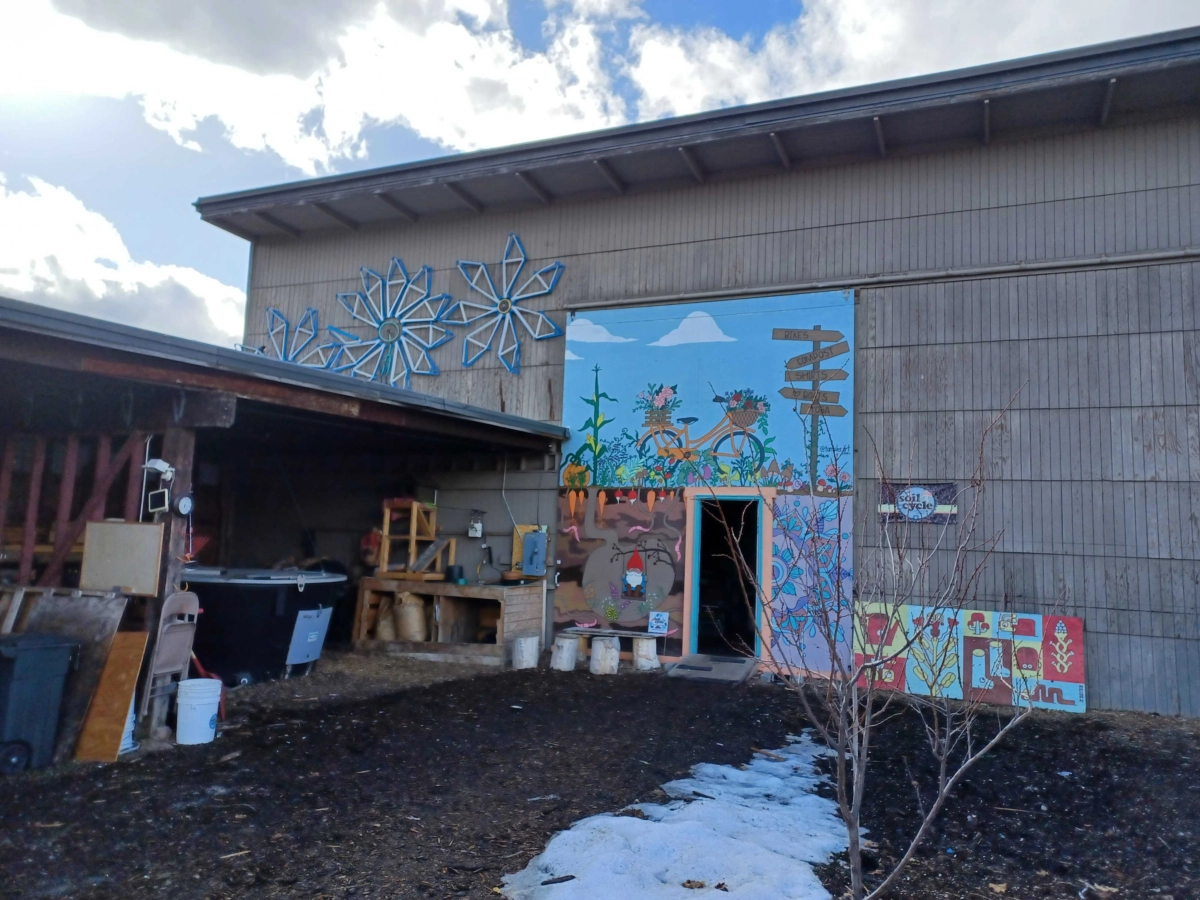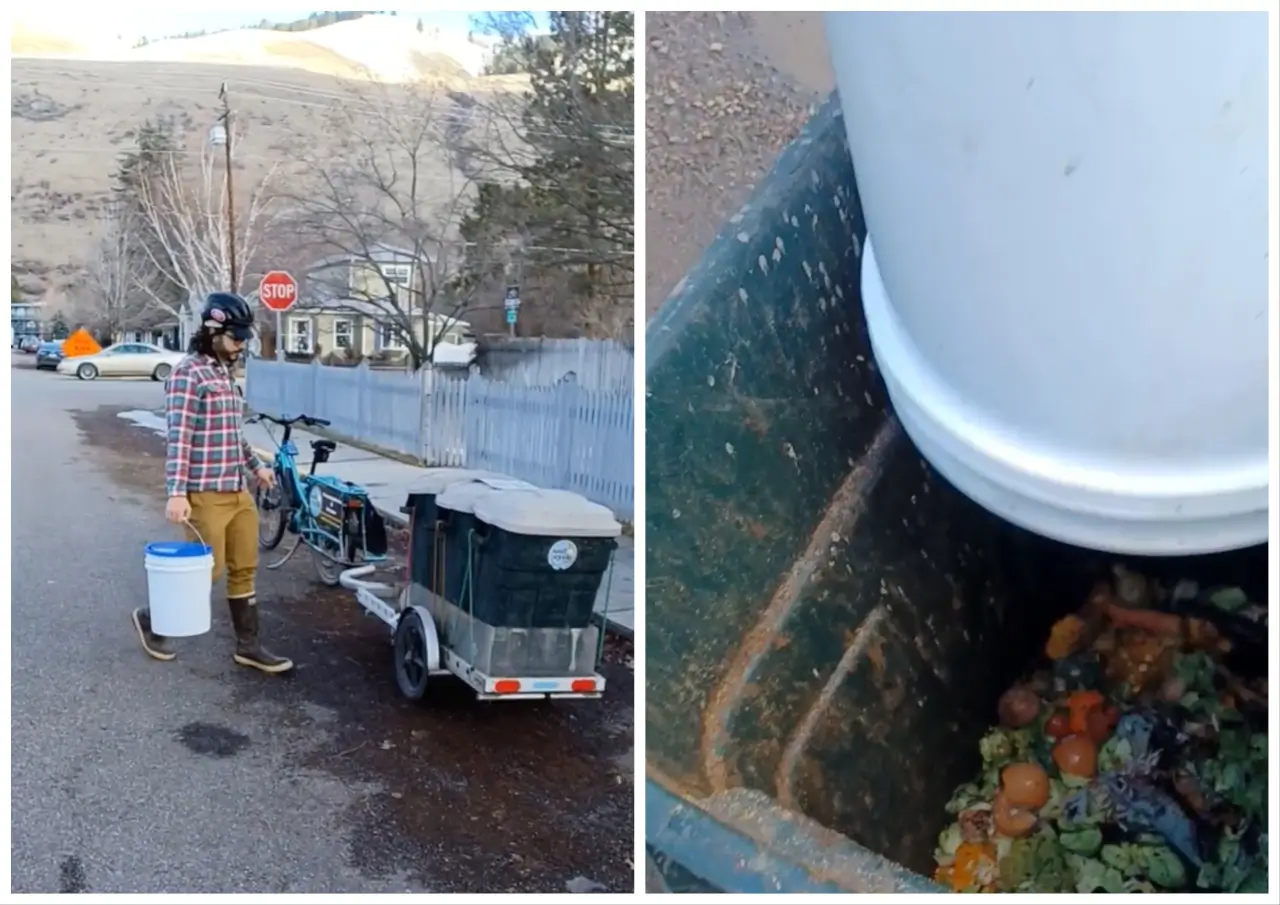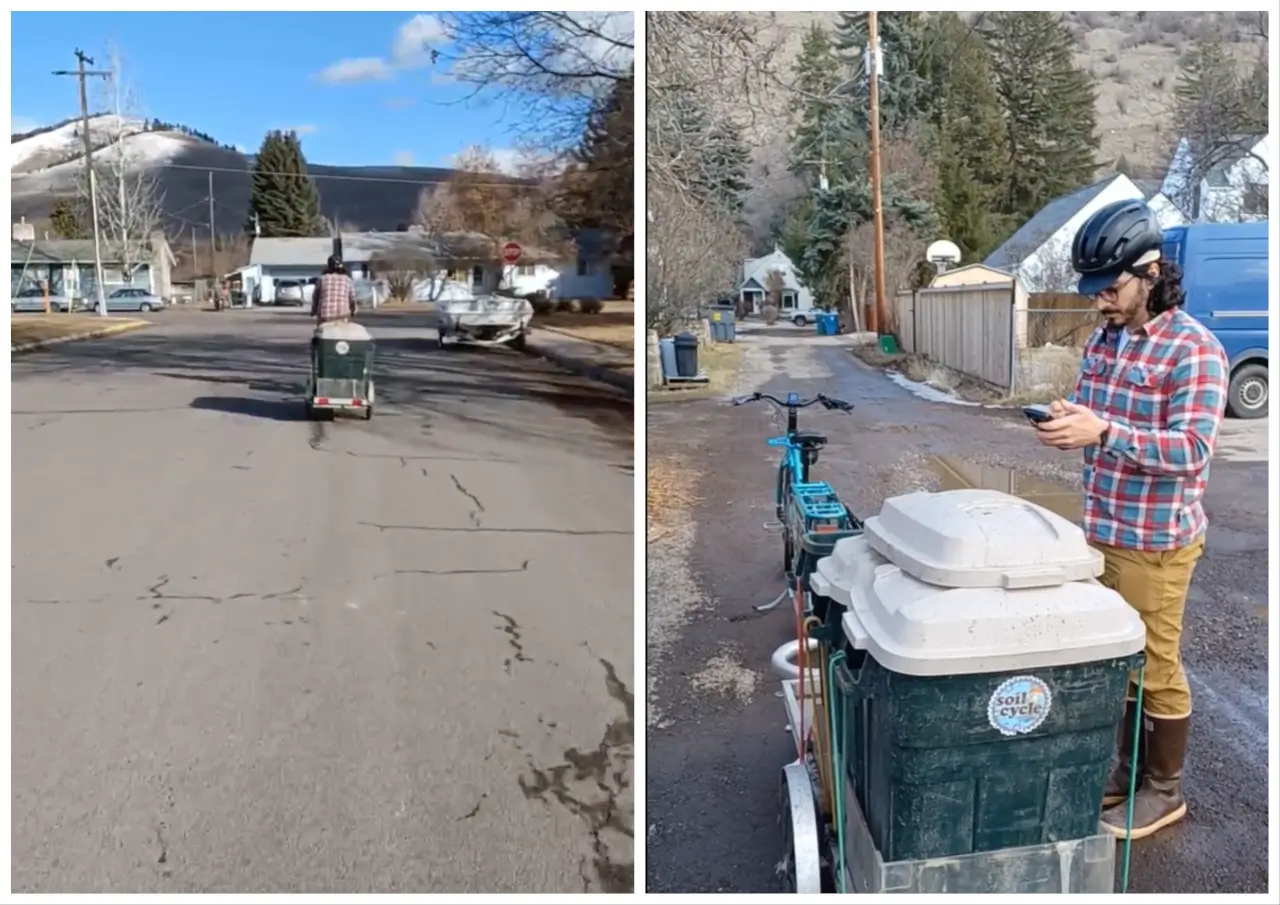Spotlight On the Modern Composters on Wheels
Soil Cycle picks up food waste on bikes and turns it into compost for its customers.
Spotlight On the Modern Composters on Wheels
Soil Cycle picks up food waste on bikes and turns it into compost for its customers.

The Soil Cycle headquarters in Missoula, MontanaPhoto by Lena Beck
For a Friday afternoon in February, the weather in Missoula, Montana, is uncharacteristically spring-like. The sun feels warm through a thin jacket and the air smells like Ponderosa pines—a smell that all but disappears with winter freeze.
On this particular afternoon, Cameron Rentsch is pedaling an e-bike through Missoula’s University District. Hitched to the back of the bike is a narrow trailer, holding three tall receptacles for collecting food scraps. They won’t all get filled today as this route is quick—only eight stops. Rentsch follows a map marked with the addresses and, at each house, picks up a small white bucket filled with organic waste—apple cores, coffee grounds, wilted roses—and dumps the bucket into one of the receptacles on the back of the trailer.
Rentsch does this work for Soil Cycle, a compost-based nonprofit. Monday through Friday, Soil Cycle sends its cyclists out on the road, picking up food scraps from houses and businesses and taking them back to its facility. Not only do Soil Cycle’s staff pick up the food scraps, but a few times a year, its customers can pick up the end result: compost for their home gardens. What’s more, they do it all on bicycles, keeping the transportation sustainable. In 2023, Soil Cycle diverted more than 49,680 pounds of food scraps from the landfill. It’s a circular, closed-loop system.
Meeting a need
When Caitlyn Lewis was in graduate school at the University of Montana, there was no municipal food waste collection system in Missoula. So, after graduation, she decided that’s where she wanted to focus her energy. As a result, she founded Soil Cycle.
“I was sick of throwing my veggies away when I was cooking, and I was adulting a little bit more and cooking with more fresh produce and thinking about my waste stream a little bit more than maybe I did when I was in high school. And there was nowhere to put it.”
Missoula is far from the only city to have a community compost program, but Soil Cycle stands out for its focus on sustainable transportation. There are a handful of other communities that also have bike-powered food scraps collection, such as BK Rot in New York City and Peels & Wheels in New Haven, Connecticut. Soil Cycle has gone through several different mission shifts since its founding, but the bicycle transport has remained one of the core values, says Lewis.
“We figured we can meet as many issues in our city with one organization…soil health, food waste, carbon sequestration and sustainable transportation,” says Lewis. “It really is an example of how to do business in a different way.”
READ MORE
Composting makes sense. Why don’t more cities do it?
A few times a year, Soil Cycle is able to give the actual compost back to the customers.
“We’re creating this fertilizer that you can use on your houseplants and in your garden, and they can see firsthand how they’re making a difference,” says Elisabeth Davidson, executive director of Soil Cycle. “And I think that’s probably the biggest part in closing that loop. It’s people seeing the product that’s created by the food waste.”
Even a few years ago, the mindset around composting felt different in Missoula, says Lewis. When she started Soil Cycle, there were about 10 people who signed up right away. But others took some convincing.
“The rest were like, well, why do I need to compost? Why should I pay a service a fee to collect it? Why do you make compost?” says Lewis.

While limiting food waste is best for the environment, redirecting wasted food away from landfills is the next best option. Research from the EPA in 2023 found that 58 percent of landfill-produced methane came from wasted food. Methane is a greenhouse gas that contributes to climate change. Composting integrates oxygen into the equation, minimizing the methane produced when done correctly.
As more municipalities have created food scrap pick-ups and compost services, the directionality is often one-way. People let their food scraps be collected at the curb, says Davidson, and then their involvement ends. She hopes more people will start to wonder where those food scraps end up.
TAKE ACTION
This is the year to eat more upcycled food.
“I wish folks just knew more about where their food was going after they threw it in the compost bin,” says Davidson. “It gets sent off and then [people are] like, ‘OK, I did my part.’ And that’s true, they did do their part. But looking throughout the system, you need to think down the line of OK, where’s my food waste going after this? How is it being processed? And how is it being distributed?”
Beyond Soil Cycle and Missoula, many cities have programs where you can purchase or get compost for free, making the process more full circle. In Bozeman, Montana, Happy Trash Can Compost collects food scraps and sells the finished compost back to the community. In Los Angeles, LA Compost provides several options for obtaining free compost, through farmers markets, co-ops or community hubs. Even some of the food scraps collected through the municipal program in Portland, Oregon are processed by Recology Organics, which will sell its compost products retail.
What’s next
A little before 4 pm, Rentsch finishes the route and pulls the e-bike to a stop in front of the gate surrounding Soil Cycle’s headquarters. Dropping off the food scraps and cleaning out the receptacles is the only thing left to do today.
“We can’t save every piece of fruit—organic materials are organic and they will decompose,” says Lewis. “But we should honor them and we should make the best-quality fertilizer we can.”
Meanwhile, Lewis, who in recent years has also started a flower farm called Blue Mountain Flowers, has realized that there are some additional challenges to composting at the farm level—for example, an abundance of organic material can be hard to “turn,” a critical part of composting, if you don’t have heavy equipment. One of her goals for the coming year is to design a composting system that is easy to manage for farmers and is replicable across small farms.
“It’s a passion project of mine to create a composting system that can be replicated for small farmers,” she says. “And there’s ways to do it, without putting [in] a ton of time. You just have to be creative.”

Since Soil Cycle is hyperlocal, there’s no competition with nearby municipalities. A company or initiative doing the same thing in the next town over is a collaborator, not a rival.
“It doesn’t necessarily have to be bicycle-powered and identical to what we’re doing,” says Davidson. “But I’d say a lot of local communities are interested in creating some sort of composting service.”
And Soil Cycle’s connections stretch far beyond Montana, as more communities try to pick up the idea.
“I have a meeting with someone tomorrow, who I believe is from Ireland, [who says] ‘I want to do what you’re doing, here,’” says Davidson. “OK, let’s talk about it.”
Follow us
This work is licensed under a Creative Commons Attribution-NoDerivatives 4.0 International License.
Want to republish a Modern Farmer story?
We are happy for Modern Farmer stories to be shared, and encourage you to republish our articles for your audience. When doing so, we ask that you follow these guidelines:
Please credit us and our writers
For the author byline, please use “Author Name, Modern Farmer.” At the top of our stories, if on the web, please include this text and link: “This story was originally published by Modern Farmer.”
Please make sure to include a link back to either our home page or the article URL.
At the bottom of the story, please include the following text:
“Modern Farmer is a nonprofit initiative dedicated to raising awareness and catalyzing action at the intersection of food, agriculture, and society. Read more at <link>Modern Farmer</link>.”
Use our widget
We’d like to be able to track our stories, so we ask that if you republish our content, you do so using our widget (located on the left hand side of the article). The HTML code has a built-in tracker that tells us the data and domain where the story was published, as well as view counts.
Check the image requirements
It’s your responsibility to confirm you're licensed to republish images in our articles. Some images, such as those from commercial providers, don't allow their images to be republished without permission or payment. Copyright terms are generally listed in the image caption and attribution. You are welcome to omit our images or substitute with your own. Charts and interactive graphics follow the same rules.
Don’t change too much. Or, ask us first.
Articles must be republished in their entirety. It’s okay to change references to time (“today” to “yesterday”) or location (“Iowa City, IA” to “here”). But please keep everything else the same.
If you feel strongly that a more material edit needs to be made, get in touch with us at [email protected]. We’re happy to discuss it with the original author, but we must have prior approval for changes before publication.
Special cases
Extracts. You may run the first few lines or paragraphs of the article and then say: “Read the full article at Modern Farmer” with a link back to the original article.
Quotes. You may quote authors provided you include a link back to the article URL.
Translations. These require writer approval. To inquire about translation of a Modern Farmer article, contact us at [email protected]
Signed consent / copyright release forms. These are not required, provided you are following these guidelines.
Print. Articles can be republished in print under these same rules, with the exception that you do not need to include the links.
Tag us
When sharing the story on social media, please tag us using the following: - Twitter (@ModFarm) - Facebook (@ModernFarmerMedia) - Instagram (@modfarm)
Use our content respectfully
Modern Farmer is a nonprofit and as such we share our content for free and in good faith in order to reach new audiences. Respectfully,
No selling ads against our stories. It’s okay to put our stories on pages with ads.
Don’t republish our material wholesale, or automatically; you need to select stories to be republished individually.
You have no rights to sell, license, syndicate, or otherwise represent yourself as the authorized owner of our material to any third parties. This means that you cannot actively publish or submit our work for syndication to third party platforms or apps like Apple News or Google News. We understand that publishers cannot fully control when certain third parties automatically summarize or crawl content from publishers’ own sites.
Keep in touch
We want to hear from you if you love Modern Farmer content, have a collaboration idea, or anything else to share. As a nonprofit outlet, we work in service of our community and are always open to comments, feedback, and ideas. Contact us at [email protected].by Lena Beck, Modern Farmer
March 15, 2024
Modern Farmer Weekly
Solutions Hub
Innovations, ideas and inspiration. Actionable solutions for a resilient food system.
ExploreShare With Us
We want to hear from Modern Farmer readers who have thoughtful commentary, actionable solutions, or helpful ideas to share.
SubmitNecessary cookies are absolutely essential for the website to function properly. This category only includes cookies that ensures basic functionalities and security features of the website. These cookies do not store any personal information.
Any cookies that may not be particularly necessary for the website to function and are used specifically to collect user personal data via analytics, ads, other embedded contents are termed as non-necessary cookies.
Shout-out to my local food scrap service Scrapcycle here in Indiana! I love this concept.